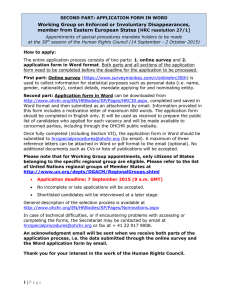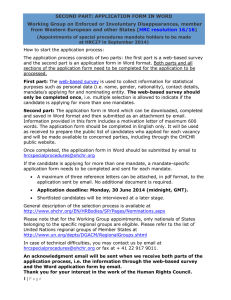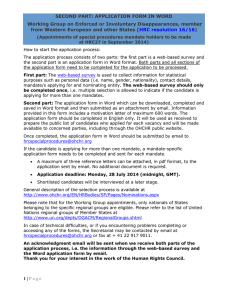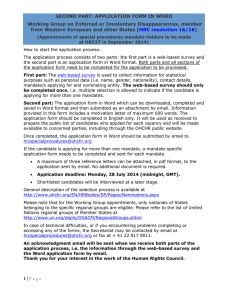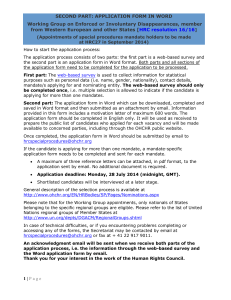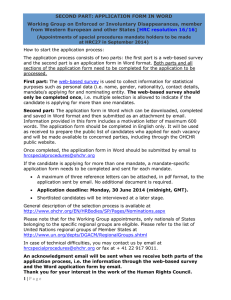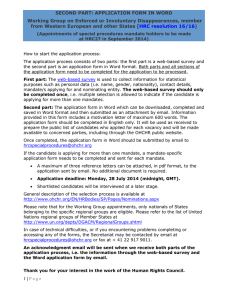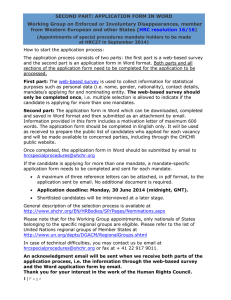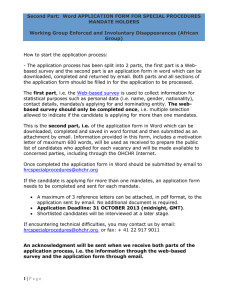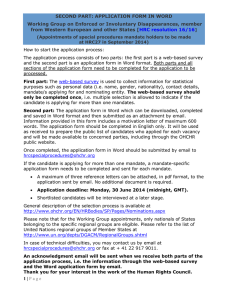Working Group on Enforced or Involuntary Disappearances,
advertisement
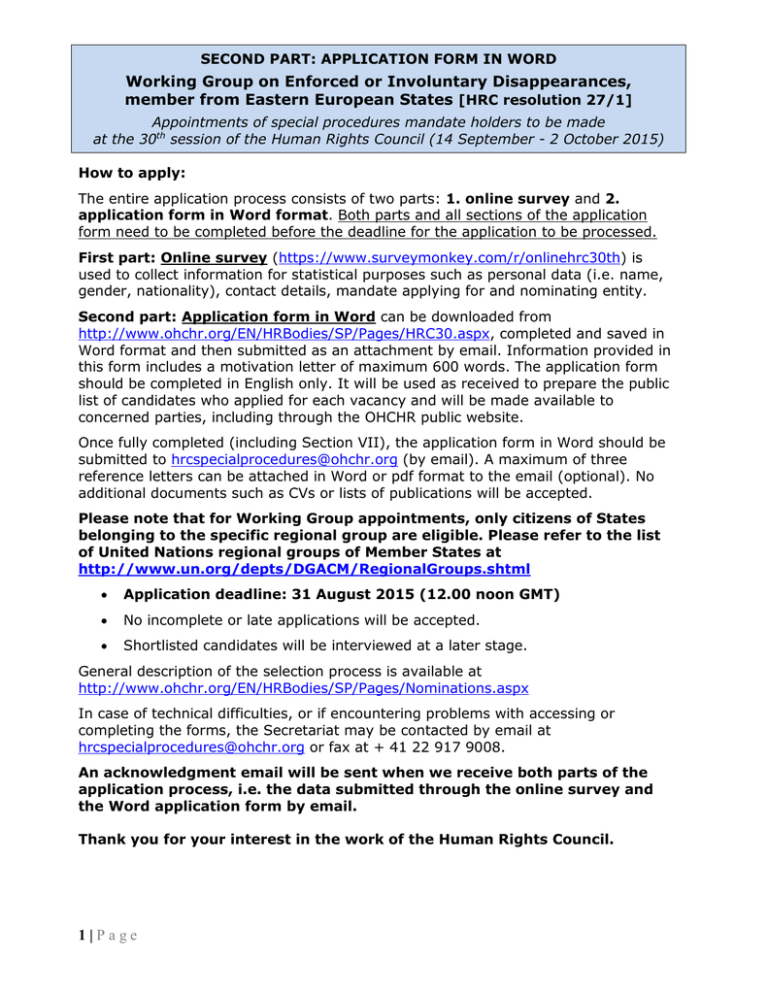
SECOND PART: APPLICATION FORM IN WORD Working Group on Enforced or Involuntary Disappearances, member from Eastern European States [HRC resolution 27/1] Appointments of special procedures mandate holders to be made at the 30th session of the Human Rights Council (14 September - 2 October 2015) How to apply: The entire application process consists of two parts: 1. online survey and 2. application form in Word format. Both parts and all sections of the application form need to be completed before the deadline for the application to be processed. First part: Online survey (https://www.surveymonkey.com/r/onlinehrc30th) is used to collect information for statistical purposes such as personal data (i.e. name, gender, nationality), contact details, mandate applying for and nominating entity. Second part: Application form in Word can be downloaded from http://www.ohchr.org/EN/HRBodies/SP/Pages/HRC30.aspx, completed and saved in Word format and then submitted as an attachment by email. Information provided in this form includes a motivation letter of maximum 600 words. The application form should be completed in English only. It will be used as received to prepare the public list of candidates who applied for each vacancy and will be made available to concerned parties, including through the OHCHR public website. Once fully completed (including Section VII), the application form in Word should be submitted to hrcspecialprocedures@ohchr.org (by email). A maximum of three reference letters can be attached in Word or pdf format to the email (optional). No additional documents such as CVs or lists of publications will be accepted. Please note that for Working Group appointments, only citizens of States belonging to the specific regional group are eligible. Please refer to the list of United Nations regional groups of Member States at http://www.un.org/depts/DGACM/RegionalGroups.shtml Application deadline: 31 August 2015 (12.00 noon GMT) No incomplete or late applications will be accepted. Shortlisted candidates will be interviewed at a later stage. General description of the selection process is available at http://www.ohchr.org/EN/HRBodies/SP/Pages/Nominations.aspx In case of technical difficulties, or if encountering problems with accessing or completing the forms, the Secretariat may be contacted by email at hrcspecialprocedures@ohchr.org or fax at + 41 22 917 9008. An acknowledgment email will be sent when we receive both parts of the application process, i.e. the data submitted through the online survey and the Word application form by email. Thank you for your interest in the work of the Human Rights Council. 1|Page SECOND PART: APPLICATION FORM IN WORD Working Group on Enforced or Involuntary Disappearances, member from Eastern European States [HRC resolution 27/1] Appointments of special procedures mandate holders to be made at the 30th session of the Human Rights Council (14 September - 2 October 2015) I. PERSONAL DATA 1. Family name: Timofeev 5. Sex: Male Female 2. First name: Maxim 6. Year of birth: 1978 3. Maiden name (if any): 7. Place of birth: Chernivtsi, Ukraine 4. Middle name: Timofeevich 8. Nationality (please indicate the nationality that will appear on the public list of candidates): Russian Federation 9. Any other nationality: No II. MANDATE - SPECIFIC COMPETENCE / QUALIFICATIONS / KNOWLEDGE NOTE: Please describe why the candidate’s competence / qualifications / knowledge is relevant in relation to the specific mandate: 1. QUALIFICATIONS (200 words) Relevant educational qualifications or equivalent professional experience in the field of human rights; good communication skills (i.e. orally and in writing) in one of the six official languages of the United Nations (i.e. Arabic, Chinese, English, French, Russian, Spanish.) I hold a Specialist in Law Degree with Honours from the Russian Customs Academy (Moscow) and a Candidate of Legal Science (Ph.D.) Degree from the Moscow State Academy of Law. Starting from my postgraduate years, human rights instruments and bodies, both nationaly and internationaly, have been in a centre of my research and teaching interests. I am fluent in both written and speaking English language. 2. RELEVANT EXPERTISE (200 words) Knowledge of international human rights instruments, norms and principles. (Please state how this was acquired.) Knowledge of institutional mandates related to the United Nations or other international or regional organizations’ work in the area of human rights. (Please state how this was acquired.) Proven work experience in the field of human rights. (Please state years of experience.) I have an in-depth knowledge of international human rights law (both universal and regional human rights systems) with a particular focus on the European human rights 2|Page SECOND PART: APPLICATION FORM IN WORD Working Group on Enforced or Involuntary Disappearances, member from Eastern European States [HRC resolution 27/1] Appointments of special procedures mandate holders to be made at the 30th session of the Human Rights Council (14 September - 2 October 2015) mechanisms. My expertise stems from both relevant studies and work experience. During my studies in Russia I focused mostly on comparative constitutional law and human rights. In 2010, as a Chevening Fellow I completed the Course “Implementing Human Rights Conventions” at Human Rights Law Centre, the University of Nottingham School of Law. Holding positions of legal analyst at two Russian human rights NGOs (2002–2011), I conducted research, drafted legal memoranda, and edited publications concerning human rights issues. My research experience includes both editing (scholarly volumes and academic peer-review journals, namely International Justice Journal, Russian Law Journal, Journal of Constitutionalism and Human Rights) and authoring publications on human rights. I have been teaching human rights related courses in academia. As an international consultant, I have been conducting human rights trainings organised by the Council of Europe in Ukraine and Azerbaijan (2013–2015). My overall work experience in the field of human rights amounts to seventeen (17) years. 3. ESTABLISHED COMPETENCE (200 words) Nationally, regionally or internationally recognized competence related to human rights. (Please explain how such competence was acquired.) I took post-graduate courses on issues of international human rights law. I have taught LL.B. and LL.M. courses, conducted research, authored articles and edited scholarly volumes in the field of international human rights law; as an expert of Council of Europe , I have participated in four different projects aimed at training legal professionals (judges and members of the bar) in two different countreis (Ukraine and Azerbaijan). 4. FLEXIBILITY/READINESS AND AVAILABILITY OF TIME (200 words) to perform effectively the functions of the mandate and to respond to its requirements, including participating in Human Rights Council sessions in Geneva and General Assembly sessions in New York, travelling on special procedures visits, drafting reports and engaging with a variety of stakeholders. (Indicate whether candidate can dedicate an estimated total of approx. three months per year to the work of a mandate.) I am willing and able to dedicate approximately three month a year to the work of a mandate. I hold an academic position. This position allows me a flexible timetable. Half of my workload as an associate professor at the European Humanities University relates to distant learning courses which means that I can discharge my academic duties while traveling. 3|Page SECOND PART: APPLICATION FORM IN WORD Working Group on Enforced or Involuntary Disappearances, member from Eastern European States [HRC resolution 27/1] Appointments of special procedures mandate holders to be made at the 30th session of the Human Rights Council (14 September - 2 October 2015) III. MOTIVATION LETTER (600 word limit) I have been involved in research and teaching concerning both domestic and international human rights for seventeen years. Introducing law students and legal profressionals to the interesting, inspirational, and sometimes contravercial terrain of international human rights law has been a great endevour. One of the reoccuring topics in human rights trainings that I led has been the issue of relative lack of awareness of members of the bar and judges of the universial human rights mechanisms. That got me interested in particular in the Special Procedures of the Human Rights Council. Regional mechanisms might seem more effective and thus more appealing to human right practitioners ‘on a field’, but remit is not the sole reason why regional mechanisms are effective (or should I say, perceived as being more effective). The awareness of the respective human rights mechanism shred by human rights advocates and legal practitioners is vital too. My particular interest in the current mandate stems from my recent research at the Central European University, that concerns the issues of the Dead, Collective Memory and Human Rights Law. As part of my thesis I analyse cases that concern the fate of those, who were killed or disappeared in the context of totalitarian / authoritarian regimes or armed conflict, when they are brought to international courts by relatives of deceased during the period of transition. Searching for bodies and reburials have been the part of the transition in post-conflict countries, as well as essential for a formation of a new identity. In this context applicants question the official narrative of the past. Constitutional / human rights proceedings become arenas where the ‘struggle’ between competing memories and narratives of the past takes place. Apart from it, I has been witnessing a disappointing and, indeed, alarming fact that disappearances in their varieties and domestic particularities do not to seem to disappear from the map of the Earth, but rather are spreading to the regions that previously were not known as stained by such outrageous practice. I hope to contribute to the noble cause of combating the disappearances worldwide. 4|Page SECOND PART: APPLICATION FORM IN WORD Working Group on Enforced or Involuntary Disappearances, member from Eastern European States [HRC resolution 27/1] Appointments of special procedures mandate holders to be made at the 30th session of the Human Rights Council (14 September - 2 October 2015) IV. LANGUAGES (READ / WRITTEN / SPOKEN) Please indicate all language skills: Mother tongue: Russian Arabic: Yes or no: No If yes, Read: Easily or Not easily: Write: Easily or Not easily: Speak: Easily or Not easily: Chinese: Yes or no: No If yes, Read: Easily or not easily: Write: Easily or not easily: Speak: Easily or not easily: English: Yes or no: Yes If yes, Read: Easily or not easily: Easily Write: Easily or not easily: Easily Speak: Easily or not easily: Easily French: Yes or no: No If yes, Read: Easily or not easily: Write: Easily or not easily: Speak: Easily or not easily: Russian: Yes or no: Yes If yes, Read: Easily or not easily: Easily Write: Easily or not easily: Easily Speak: Easily or not easily: Easily Spanish: Yes or no: No If yes, Read: Easily or not easily: Write: Easily or not easily: Speak: Easily or not easily: 5|Page SECOND PART: APPLICATION FORM IN WORD Working Group on Enforced or Involuntary Disappearances, member from Eastern European States [HRC resolution 27/1] Appointments of special procedures mandate holders to be made at the 30th session of the Human Rights Council (14 September - 2 October 2015) V. EDUCATIONAL RECORD NOTE: Please list the candidate’s academic qualifications (university level and higher). Name of degree and name of academic institution: Years of attendance (provide a range from-to, for example 1999-2003): Place and country: Candidate of Legal Science (Ph.D.), Moscow State Academy of Law, Foreign Constitutional Law Department 2002-2005 Moscow, Russia Specialist in Law (Honours), Russian Customs Academy, Department of Legal Studies 1995-2000 Moscow, Russia 6|Page SECOND PART: APPLICATION FORM IN WORD Working Group on Enforced or Involuntary Disappearances, member from Eastern European States [HRC resolution 27/1] Appointments of special procedures mandate holders to be made at the 30th session of the Human Rights Council (14 September - 2 October 2015) VI. EMPLOYMENT RECORD NOTE: Please briefly list ALL RELEVANT professional positions held, beginning with the most recent one. Name of employer, functional title, main functions of position: Years of work (provide a range from-to, for example 1999-2005): Place and country: European Humanities University, Associate Profesor; teaching international human rights law and public international law (at both LL.B. and LL.M. levels); supervising LL.B. and LL.M. theses on issues of international human rights law and public international law; conducting research in international human rights law 2014-until present Vilnius, Lithuania St. Petersburg Branch of the Russian Law Academy of the Ministry of Justice of the Russian Federation, Associate Professor (Docent); teaching courses on comparative constitutional law; supervising theses on issues of constitutional law, international human rights law and public international law; conducting research in international human rights law 2007-2011 St. Petersburg, Russia St. Petersburg Human Rights NGO ‘Citizens' Watch’, Legal Analyst; drafting legal memoranda on issues concerning human rights law; editing publications on issues of human rights law 2006-2011 St. Petersburg, Russia Independent Non-for-profit Organization ‘Lawyers for Constitutional Rights and Liberties’ (JURIX), Legal Analyst; drafting legal memoranda on issues concerning human rights law; editing publications on issues of human rights law 2002-2005 Moscow, Russia 7|Page SECOND PART: APPLICATION FORM IN WORD Working Group on Enforced or Involuntary Disappearances, member from Eastern European States [HRC resolution 27/1] Appointments of special procedures mandate holders to be made at the 30th session of the Human Rights Council (14 September - 2 October 2015) VII. COMPLIANCE WITH ETHICS AND INTEGRITY PROVISIONS (of Human Rights Council resolution 5/1) Section to be completed by the candidate or the nominating entity on his/her behalf. 1. To your knowledge, does the candidate have any official, professional, personal, or financial relationships that might cause him/her to limit the extent of their inquiries, to limit disclosure, or to weaken or slant findings in any way? If yes, please explain. No 2. Are there any factors that could either directly or indirectly influence, pressure, threaten, or otherwise affect the candidate’s ability to act independently in discharging his/her mandate? If yes, please explain: No 3. Is there any reason, currently or in that past, that could call into question the candidate’s moral authority and credibility or does the candidate hold any views or opinions that could prejudice the manner in which she/he discharges his mandate? If yes, please explain: No 4. Does the candidate comply with the provisions in paragraph 44 and 46 of the annex to Human Rights Council resolution 5/1? Para. 44: The principle of non-accumulation of human rights functions at a time shall be respected. Para. 46: Individuals holding decision-making positions in Government or in any other organization or entity which may give rise to a conflict of interest with the responsibilities inherent to the mandate shall be excluded. Mandate holders will act in their personal capacity. Yes 5. Should the candidate be appointed as a mandate holder, he/she will have to take measures to comply with paragraphs 44 and 46 of the annex to Council resolution 5/1. In the event that the current occupation or activity, even if unpaid, of the candidate may give rise to a conflict of interest (e.g. if a candidate holds a decision-making position in Government) and/or there is an accumulation of human rights functions (e.g. as a member of another human rights mechanism at the international, regional or national level), necessary measures could include relinquishing positions, occupations or activities. If applicable, please indicate the measures the candidate will take. No 8|Page ****
